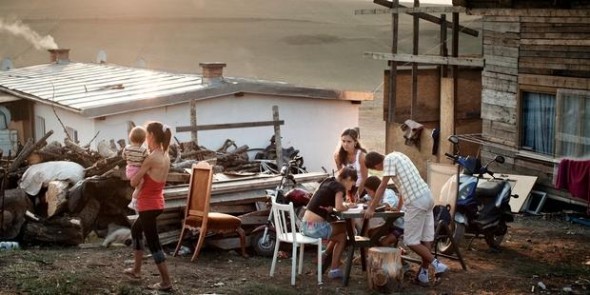December 17, 2012

Around 300 Roma people evicted from Coastei Street in central Cluj now live on the edge of a landfill. Photo: Mugur Vărzariu
Two years ago the local authorities of Cluj-Napoca forcibly evicted around 300 people – mostly Roma – from Coastei Street in the centre of the Romanian city. Since then, most of them have been living close to the landfill and a chemical waste dump in an area on the outskirts known as Pata Rât, where they were moved by the municipality.
Soon after their eviction, Romani people started a long struggle for justice. One of them is Ernest Creta who now lives in an improvised home in Pata Rât.
“It is a sad anniversary for us. On 17 December 2010, early in the morning, an impressive number of police forces arrived on Coastei Street, joined by the local authorities. We were overwhelmed and terrified by the number of police officers. Following pressure and verbal threats from the local authorities, we accepted the housing they proposed without knowing the exact location and the condition it was in,” said Creta.
And it turned out the new conditions were grim. Around 36 out of the 76 evicted families were not offered any alternative accommodation and were effectively left homeless.
The remaining 40 families were provided with one room per family. They each have to share communal bathrooms with three other families. The main connection with the city is a school bus that leaves at 7.15 am. The closest regular bus stop is 2.5 kilometres away across the railway.
“We were integrated in the life of the city when lived in Coastei Street. We used to have jobs, the children went to high school, we had decent living standards, we had access to the park, etc. Here, by the garbage dump, we feel like in a ghetto, we feel discriminated against from all points of view,” said Creta.
For the past two years, the Working Group of Civil Society Organizations (gLOC), Amnesty International and European Roma Rights Centre (ERRC) have been supporting people from the former Coastei Street in their struggle for justice and dignity. In their joint statement issued at the anniversary of the December 2010 eviction, the organizations appeal on the local authorities in Cluj-Napoca:
“The municipality carried out a forced eviction that violated the human rights standards applicable in Romania. Central government failed to ensure that the municipality’s actions did not lead to human rights violations. The local and central authorities have an urgent responsibility to put this violation right and to ensure that people who were forcibly evicted are relocated to adequate housing, and brought back to the city.”
People evicted from Coastei Street have been trying to meet the authorities and raise the problem of their living conditions ever since the eviction. The municipality finally met with them earlier this year.
The authorities said they would move the Romani people away from Pata Rât in early 2014, as part of a joint project with the United Nations Development Programme. However details of the planned relocation are vague and the Romani community face another year of living in substandard accommodation that stops them from fully accessing their basic rights to education, employment and healthcare.
There are some 1,500 people living in Pata Rât area, including around 300 people from the former Coastei Street. The others reside in Cantonului Street, Dallas and a number of people live on the city’s landfill.
Iosif Adam, a resident from Cantonului Street explained: “We just started to organize ourselves. We do not want to be forgotten. Many of us were moved here by the local authorities starting in 2002. We were told that this is going to be a temporary location for us. And here we are in 2012: struggling with the lack of identity papers, electricity, and water. It is a precarious life, life in a great insecurity.”
To mark the second anniversary of the 17 December eviction, around 200 people will surround the Cluj-Napoca’s City Hall. The activists will be calling on the local authorities to bring the Roma back into the city.
Source: Amnesty International

Leave a Reply